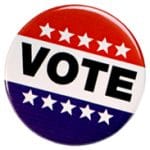SMART Transportation Division Virginia State Legislative Director Ronnie Hobbs issued a reminder Oct. 16 that absentee voting in-person or by mail has begun for the state’s Nov. 5 general elections.
Voters can cast absentee ballots in person at their local voting registration office.
Virginia members can visit this link for their absentee in-person location or Virginia members can visit this link to apply online for an absentee ballot.
By voting absentee, Virginia residents can make sure their work schedule or a family emergency does not impact their right to vote. To vote absentee in Virginia, voters must have a reason (code 1D or 1E should work for rail workers and retirees).
“No matter whom you choose, choose to vote early!” Hobbs said.
Tag: early voting

“In-person early voting is restored on the three days immediately preceding all future election days for all eligible voters. Secretary of State Jon Husted shall be responsible for setting business hours for such voting to preserve the right of all Ohio voters to cast his or her vote with said hours to be uniform throughout the state and suitable to the needs of the particular election in question,” Economus said in the decision.
Earlier this year, Husted issued a directive setting uniform statewide early voting hours for the 2014 election that didn’t include any Sundays or the Monday before Election Day.
The court’s action follows a previous decision that restored early voting hours leading up to the 2012 election.
Secretary Husted said he would comply with the court’s ruling and hailed it as a vindication of his effort to impose uniform voting procedures statewide.
“I am pleased that the federal court has affirmed what I have long advocated – that all voters, no matter where they live, should have the same opportunity to vote. Thankfully, uniformity and equality won the day,” Husted said.
Secretary Husted had urged the legislature to pass a law setting uniform early voting hours statewide but got little interest from his Republican colleagues.
“This ruling shows how important these last three days are to ensure equal access to the ballot, and the hours set by Secretary Husted should reflect that,” Ohio Democratic Party Chairman Chris Redfern said in a statement.
Democratic National Committee Chair Debbie Wasserman Schultz said 96,000 Ohioans cast their ballots during the final three days of early voting in the 2012 presidential election.
“This November and beyond, thousands more will be able to join them,” Schultz said.
The court case stems from a series of legislative actions last session when Republicans passed a far-ranging elections measure that reduced the early in-person voting period.

Most states permit early voting by those who may not be near their voting location on Election Day.
For UTU members who work unconventional hours and are frequently at away-from-home terminals, early voting assures you will be able cast a ballot.
Early voting is different than casting an absentee ballot.
To determine if your state permits early voting, and to view the instructions and dates for casting an early ballot, click on the following link and scroll down to your state:
http://www.longdistancevoter.org/early_voting_rules#.UGBaipgzK5R
There is also time, in most states, for requesting an absentee ballot. For more information on obtaining an absentee ballot, click on the following link and then click on your state:
http://www.longdistancevoter.org/absentee_ballots
This may be the most important election in the careers of transportation workers and their families. Don’t allow others to determine your future.
Also, if you are voting absentee by mail, note that your ballot might need extra postage.
Many absentee ballots for the Nov. 4 presidential election are so long and weigh so much that mailing them back to elections supervisors requires extra postage, in many cases.
The U.S. Postal Service generally returns mail with insufficient postage to the sender, but that can take days.
Mailing costs vary, depending on everything from the size of the envelope to the weight of the paper. Check with your local postal authorities for proper postage.